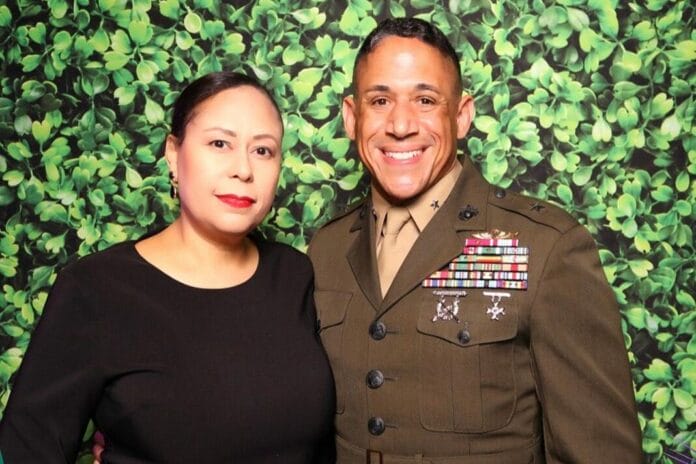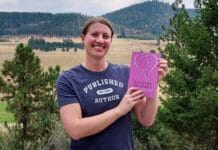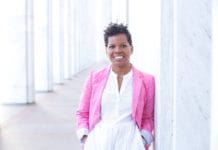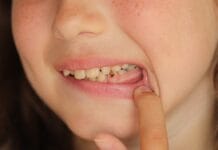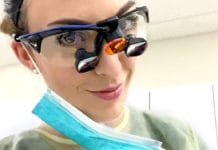One of my favorite parts of attending conferences is having the opportunity to meet fellow hygienists across the country. This summer, I was fortunate to take a course at the last minute one day, and it was such an unexpected surprise. One person at my table was Enid Randall, RDH. The conversation at my table was refreshing, eye-opening, and enjoyable.
She was a dental assistant for 10 years and has been a hygienist for 16 years. Enid has worked throughout the country and even abroad! Her husband Omar is a brigadier general in the United States Marine Corps. He has been in the Marine Corps for twenty-eight years and is currently stationed in New Orleans, Louisiana. As a military family, they usually move every two to three years to a new duty station.
I was so intrigued by Enid’s story and being a member of a military family. I was curious about her past experiences in the profession, frequently working in different places, and the process she must go through.
Machado: What made you decide to become a dental hygienist? What is your why?
Randall: I was a registered dental assistant and a certified dental assistant, and then I became a registered dental assistant in extended functions after taking the course at UCLA. I consider myself a lifelong learner, so becoming a dental hygienist was the natural next step.
Machado: Where did you go to dental hygiene school?
Randall: As a military spouse, we were stationed at Camp Lejeune at the time, so I attended Coastal Carolina Community College in Jacksonville, North Carolina. I also have a bachelor’s degree in healthcare management from Southern Illinois University.
Machado: What is your favorite aspect of being a dental hygienist?
Randall: There are a few things. I enjoy developing a rapport with my patients and having them trust me. Many people do not enjoy going to the dental office, so I am happy to make their experience more enjoyable than they thought it would be.
I enjoy helping patients achieve optimal oral health. I love to see cases where you see a complete turnaround, and now the patients know how to keep themselves healthy.
Machado: How does being stationed in different places work?
Randall: The military gives us orders on where we will be stationed, and generally, the orders are for two to three years. However, some can be much shorter than that.
Machado: What is on base? How many families usually live on base?
Randall: A base in an installation that shelters a country’s armed forces equipment and personnel and facilitates training and operations. They can be located throughout the United States, and some are overseas.
How many families live on base depends on the base. Some bases are like cities, with base schools, restaurants, movie theaters, post offices, pools, shopping facilities, and more.
Machado: Can you describe what it is like to live on a military base?
Randall: I love the safety of living on a military base since the majority of them are secured by armed guards. You must show a military ID to get inside the base. Otherwise, living on a base is similar to living out in a civilian town, except all your neighbors are military. I feel that you get to know your neighbors better on a military base and that the children are freer to roam around and play.
Machado: Where was your favorite place to be stationed and why?
Randall: My favorite duty station has been Okinawa, Japan. We were stationed there twice. The first time was for two years. The second time, we were there for four years. I love everything about that little island. The people are kind, the food is amazing, and the travel opportunities throughout Asia are amazing. I can go on and on. I have been stationed in many places, but Okinawa will always be in my heart!
Machado: Were there any observations that stood out to you when working in different places around the world?
Randall: Yes! Some places have no fluoride in their public water yet have a very low incidence of caries. This is due to the differences in diet and customs. For example, I remember visiting Korea and eating at a restaurant. When I went to the public restroom, people were there brushing their teeth after their meal. It is also very common for them to bring their oral care products with them and brush while at school, at work, and even when they are out and about.
Machado: How do you find a job on a military base?
Randall: The easiest way to find a job on a military base is through usajobs.gov, although contractors also post jobs on base. You don’t have to be military-related to work on base, but veterans and military spouses do get preference.
Machado: Can you describe what a dental office looks like on base? Are there differences from civilian practice?
Randall: On base, a dental clinic can be a standalone or inside a military hospital. A dental office looks exactly like what you would find in a regular civilian dental office. Working on base is similar to civilian practice, except your patients are in the military, so there is no pressure to “produce” as you do in civilian practice.
The patients receive the services they need, but the main goal is to ensure the service members are up to date with dental exams and radiographs and have completed any needed treatment so that they can be “deployment ready.” The staff is mostly military, although some civilians will also work there. The military can sometimes have their own military-trained hygienists as well.
You don’t have to deal with insurance, which I never realized could be so freeing. It’s also nice having the instruments and things you need. I always had nice, sharp instruments. For the most part, the patients were pleasant and respectful, and I felt very appreciated. Patients very seldom no showed (because they could get in trouble), and if they came late, they would be rescheduled so they were always on time.
Unfortunately, the pay structure needs to be improved because the pay is considerably lower on military bases. On the upside, the benefits are excellent compared to civilian practice. Some take the pay cut because of the many benefits.
Some of the benefits include medical, dental, and vision coverage, paid federal holidays, sick days, time off for jury duty, and continuing education is paid for. When I worked on base, three days out of the week, we had an hour to work out, which was paid! If I needed to take time off that I earned, it would not be a huge hassle like it is in civilian practice. So, in general, I would feel way less stressed.
Machado: What challenges or struggles have you faced as a hygienist from moving across states or countries regularly?
Randall: Moving frequently has been such a struggle because the process and requirements for obtaining a dental hygiene license vary from state to state. In some instances, I had to re-take clinical boards which was expensive and time-consuming. This leads to struggles in getting a job in a timely fashion, often leading to loss of finances. I have become an expert board taker!
It is also not uncommon to repeat duty stations, meaning I must keep several state licenses active simultaneously, which becomes expensive. I am glad to see the Dentist and Dental Hygienist Interstate Compact, which aims to help with license portability for all hygienists. Hopefully, more states will join soon.
Another challenge is that not many jobs are open on base. Unfortunately, there may be instances where no jobs may be available if the few existing dental hygiene jobs are already filled. For example, I was the only hygienist when I worked at the dental clinic at what was then known as Fort Belvoir Community Hospital, a military hospital in Virginia. Military spouse unemployment is a real issue, even though military spouses are generally very educated.
If you are stationed overseas, sometimes, you have no choice but to work on base due to a lack of qualifications to work out in town. In other countries like Japan, for example, I could not even attempt to work as a hygienist outside the base because I would have to pass their Japanese exams and be fluent in Japanese.
Machado: Why is it important to have dental hygiene license portability?
Randall: In general, license portability for all dental hygienists is important because it will enable them to move to other areas of the country easily, which can increase access to care for patients. We keep hearing that there is a shortage of hygienists, so it may also help alleviate that issue.
For military spouses, it is a must with the frequency of our moves. The unemployment rates among military spouses are five times the national average. This contributes to declining active-duty retention rates. License portability will help with the unemployment issues for military spouses who are dental hygienists.
Machado: Do you have any issues or troubles with continuing education credit eligibility due to the different state requirements?
Randall: Surprisingly, no, that has not been an issue. The hours I acquire are applied to each state. Although, I always take more courses than necessary because some states require more credits than others. If a state requires live in-person CEs, that can be a problem, depending on your location.
Machado: Can you describe some of the differences between the states where you have worked? Were there any challenges or obstacles due to the state’s scope of practice?
Randall: The biggest challenge I’ve encountered is when I come from one state where I can do certain things, for example, administer local anesthesia, and then move to another state where administering local anesthesia is not within a hygienist’s scope of practice.
Once again, I feel that we need to have things be equal across the states, especially when it comes to scope of practice.
Machado: Do you have any advice for hygienists who are military spouses or have spouses who might make the military their career?
Randall: If your spouse intends to make a career out of the military as mine has, it is very likely that you will repeat a duty station, so keep all of your licenses active. Don’t let them lapse! Also, the active-duty member may be gone for extended periods for deployments, exercises, and training, leaving the spouse to handle all of the household responsibilities alone.
There are ebbs and flows in this lifestyle. You might find yourself in a place where you can’t work as a hygienist, leading to gaps in your employment. No worries! Take this time to do other things that can be used to fill those employment gaps. You can volunteer, work as a sub at your child’s school, or take some online courses. Work will always be there when you get back.
I had the opportunity to do things I otherwise would have never had the opportunity to do, such as being the president of a nonprofit, sitting on various boards, volunteering with my spouse’s command, traveling to other countries, and helping to improve things for upcoming and future military spouses.
Machado: Is there anything else you would like to add?
Randall: Being a military spouse has not been easy, but I wouldn’t have it any other way. I’ve had amazing experiences and met amazing people!
There is still so much that needs to be improved for dental hygienists. One way improvement can occur is by joining the ADHA. Joining the ADHA helps ensure that our interests can be represented in legislation and public policy.
Thank you for the opportunity!
In Closing
Before meeting Enid, I did not know many details about the military, especially the family and work-life aspects. Learning more about Enid and her experiences on and off the base is a great example of how unique our profession is. We do share the same mission: to care for people, educate, and prevent disease – just to name a few. This interview also shows the importance and need for license portability.
Before you leave, check out the Today’s RDH self-study CE courses. All courses are peer-reviewed and non-sponsored to focus solely on high-quality education. Click here now.

